Reposted from the IHRP's Rights Review
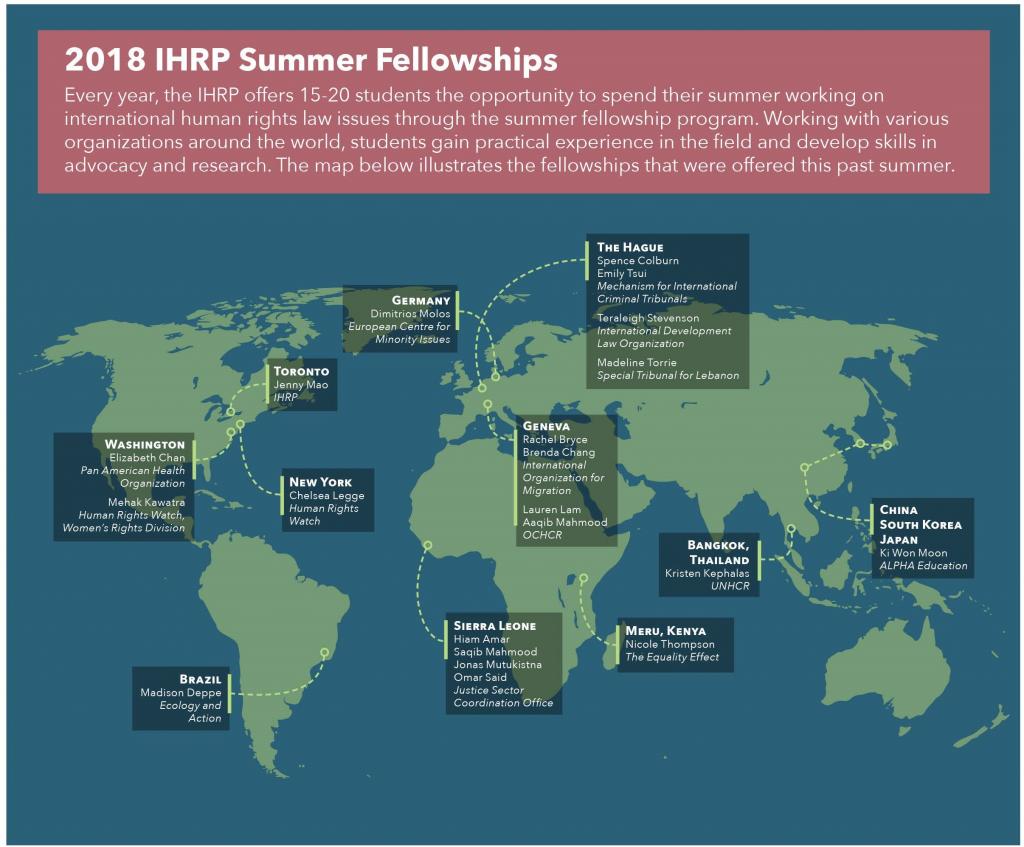
Author: Adil Munim (2L)
Found in Translation: A Summer at UNHCR Bangkok
Kristen Kephalas (2L JD/MGA)
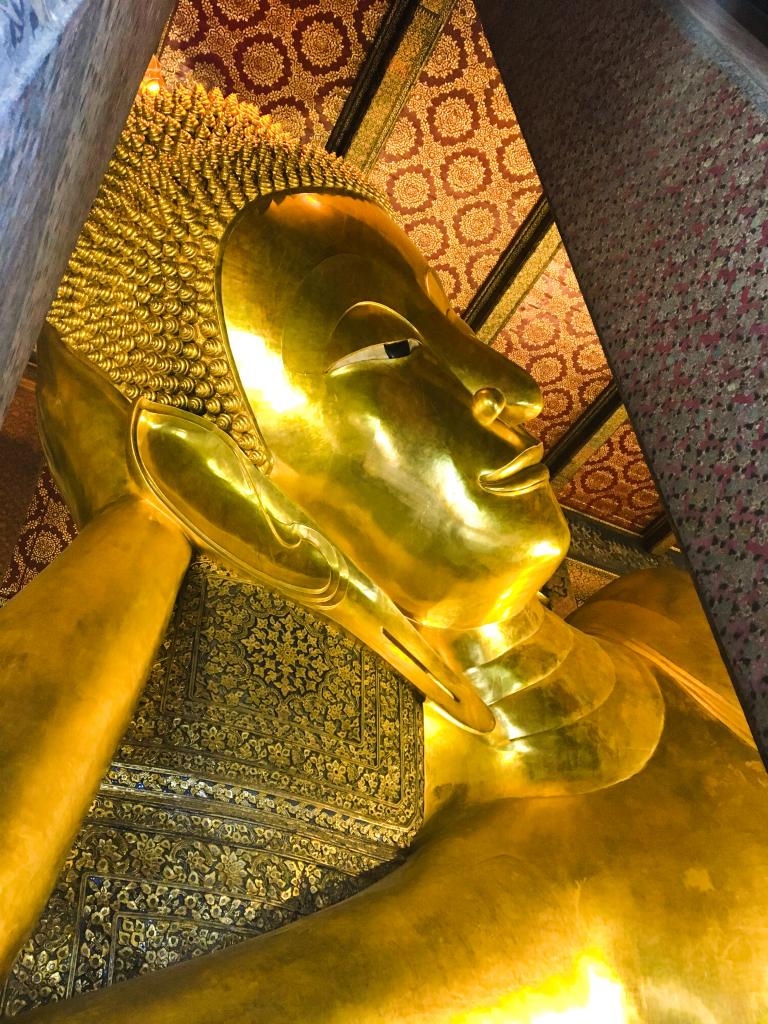
Reclining Buddha in Wat Pho. Credit: Kristen Kephalas.
I did my IHRP fellowship at the United Nations Refugee Agency (UNHCR) in Bangkok, Thailand. I came into law school committed to my passion for human rights. I knew the IHRP fellowship could help me transform my passion into a realistic career path. I decided to pursue a fellowship at the UNHCR because my interest in refugee law is what brought me to law school in the first place. Since the UNHCR is the refugee status-granting body in Thailand, I wanted to work there to familiarize myself with the decision-making process.
At work, I was tasked with a variety of responsibilities including research, one-on-one counselling, analytical writing, and investigative interviewing. I learned about the political situations, cultural intricacies, and histories of numerous countries in Asia, the Middle East, and Africa. I worked with interpreters and picked up words and phrases from various languages. I also learned about the situation for refugees in Thailand’s unique socio-political context, which turned out to be the source of one of my biggest challenges. Thailand does not recognize refugee status, so the conditions that asylum seekers and refugees face in the country are abysmal. This context severely hinders efforts to improve the livelihood of the UNHCR’s Persons of Concern (PoCs) and it is hugely disheartening. It made the work feel frustrating and sometimes futile. However, the compassion and drive of the team at UNHCR was inspiring even in the most dismal of cases.
Interviewing and counselling PoCs was the most challenging, but enriching aspect of my fellowship. With the aid of interpreters, I got to speak with PoCs individually and learn about their lives and their challenges back home and in Bangkok. I did community and protection counselling at the Bangkok Refugee Centre (BRC), a partner of the UNHCR. The BRC is a community centre that offers counselling on issues such as getting children into school, navigating financial challenges, avoiding arrest, and staying on top of the administrative requirements of asylum applications. Sometimes people come to BRC with urgent and serious concerns like homelessness, acute mental illness, and fear of violence from domestic partners. These issues in particular forced me to keep my cool and flex my problem-solving skills in order to work collaboratively with individuals to help them find immediate solutions like organizing home visits by UNHCR staff or referring them to shelters and mental health supports.
I had never been to Asia before the IHRP, so arriving in Bangkok after a twenty-four hour journey completely alone and utterly disoriented was stressful. Once the jetlag subsided, I tried to find my rhythm in a city that can turn on a dime. Bangkok is an endless trove of diverse experiences and people. Even after four months of thoroughly exploring the city, I barely scratched the surface. Yet, by the time that I had to pack up my apartment and head back to Canada, Bangkok had become a home. While I loved my day job at UNHCR, my best memories of my fellowship happened outside of work hours with the friends I made from all over the world. I found a family in Bangkok that I had not expected I would. After a grueling year of 1L where lonely late nights in Bora Laskin dominated, spending a summer surrounded by folks from all walks of life was reenergizing.
My advice to anyone looking to do an IHRP fellowship is to challenge yourself. Find an organization that will give you meaningful and difficult work in a place that is unfamiliar to you. The IHRP fellowship is a unique opportunity to get out of your comfort zone and grow as both a law student and an individual.
In the city that never sleeps, human rights activists never rest: My summer with Human Rights Watch
Chelsey Legge (4L JD/MPP)
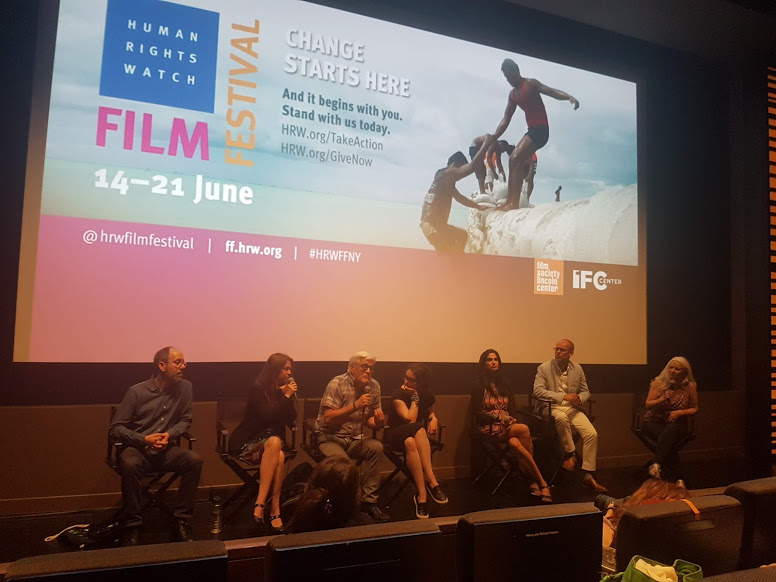
Panel discussion following the screening of The Silence of Others, with filmmakers Almudena Carraccedo & Robert Bahar, Chato Galante, film subject, Fernando Travesi Exec Dir, ICTJ and Param-Preet Singh, Assoc Dir, Intl Justic Program, HRW. Moderated by Emma Daly, Comms Director, HRW. Credit: Chelsey Legge.
If someone had tried to tell me seven years ago that I would spend the summer of 2018 working for my dream organization in an office on the 34th floor of the Empire State Building in New York City, I would have laughed. Sometimes, though, dreams really do come true.
I spent May through July working as an IHRP fellow with the Women’s Rights Division at the Human Rights Watch (HRW) headquarters in New York. Working for HRW, particularly for the Women’s Rights Division, is something I’ve wanted to do since my first year of undergrad. In fact, my desire to work for HRW was a huge factor in my decision to apply to law school; most HRW researchers have a background in either law or journalism (and deadlines scared me off journalism a long time ago).
HRW is a non-profit, non-governmental organization, known for its accurate fact-finding, impartial reporting, effective use of media, and targeted advocacy, often in partnership with local human rights groups. The Women’s Rights Division at HRW works towards the realization of women’s empowerment and gender equality, protecting the rights and improving the lives of women around the world.
My main project this summer involved providing research assistance to Skye Wheeler, the emergencies researcher for the Women’s Rights Division, for an upcoming report on violations of the human rights of sex workers in South Africa. The report is based on Skye’s interviews with sex workers and other stakeholders in South Africa. Through this experience, I learned about the alarmingly high rates of intimate partner violence, rape and other forms of sexual assault. I discovered that South Africa has specialized sexual offences courts, and an innovative approach to post-rape care in the form of Thuthuzela Care Centres -- one-stop facilities where women can receive medical care and counselling, and file a police report if they wish. I learned, in disturbing detail, about the malicious treatment of sex workers by police officers, members of the public, and clients. Police abuses against sex workers are so well-documented, I compiled a separate annex of reports on these abuses published by South African NGOs over the past decade (the most recent report was published just last year by Sonke Gender Justice).
The work was often emotionally difficult, but I knew the end result -- the HRW report and its recommendations -- would be worth it. I’m confident that the report will have a positive influence on the ongoing debate concerning the future legal status of sex work in South Africa, and I’m so proud to have played a role in its creation.
It’s almost impossible to choose my favourite memory from this summer – my conversations with Skye, the lunchtime speaker series at the office, the meals at delicious vegan restaurants all around the city. However, the HRW New York Film Festival really stands out. The festival ran for a week in June and included 15 films, 12 of which were directed or co-directed by women. I managed to see nine films the week of the festival, and two in particular have stuck with me. The first was the opening night, aptly-named film On Her Shoulders, which tells the story of Nadia Murad -- you might recognize her name as one of the recipients of this year’s Nobel Peace Prize. Nadia is a survivor of the 2014 atrocities against the Yazidi community in northern Iraq. The film follows Nadia and her supporters as she pursues justice for her community. The audience bears painful witness to the intense toll it takes on Nadia to be a spokesperson and symbol of hope for her people. The second film I can’t stop thinking about was The Silence of Others. The documentary follows a group of victims and survivors of Spain’s 40-year dictatorship under General Franco. Their pursuit of justice is impeded by “the pact of forgetting,” a 1977 amnesty law prohibiting legal action related to the oppression, torture, and murder that took place during Franco’s regime. The film subjects implore the audience, and the powers that be, to realize that there can be no healing, no peace, without justice.
The film festival stands out as my favourite memory not only because of the compelling, heartbreaking, and inspiring films, but also because of the energy around the office during that week and all the people I was able to connect with before and after the screenings. I felt like part of a community of brilliant and compassionate people who are dedicated to justice and human rights. This feeling persisted throughout my summer at HRW, and even now, months later, it lingers. I am grateful beyond measure for this experience.
The Hague to Beirut: What it's like to work for the Special Tribunal for Lebanon
Madeline Torrie (2L)
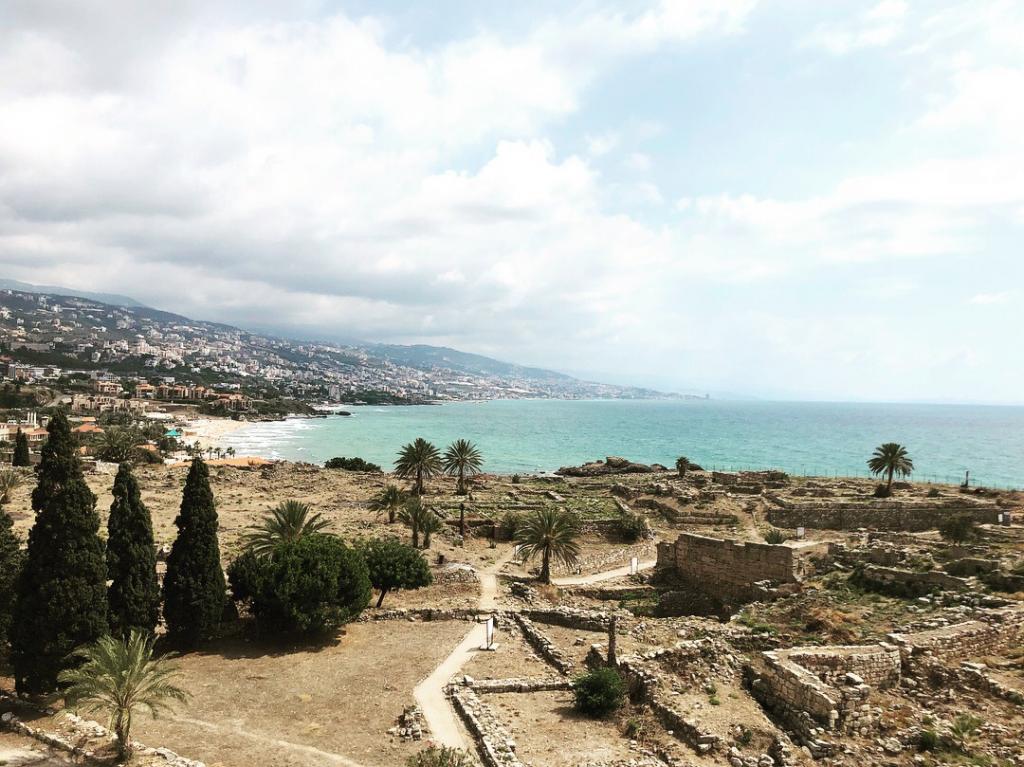
Byblos, Lebanon. Credit: Madeline Torrie.
Many have heard of the International Criminal Court, the International Court of Justice, or the International Criminal Tribunal for the former Yugoslavia, all of which are seated in the Hague. The Special Tribunal for Lebanon (STL) is less well known, but as the first international criminal tribunal to prosecute crimes of terrorism, it is an important player in the field of international criminal law. The Tribunal was created after the assassination of Lebanese Prime Minister, Rafik Hariri on February 14, 2005, when a car bomb killed him and 22 others. In addition to the prosecution of crimes of terrorism, the Special Tribunal for Lebanon has jurisdiction to prosecute related political assassinations from that time.
As a legal intern in the Appeals Chamber of the STL, I worked closely with judges and the President of the Tribunal on research created in anticipation of an appeal after the trial’s conclusion. The internship definitely improved my legal research and drafting skills, which has its own unique challenges - anyone who has tried to ‘note-up’ an international criminal law case will understand. If someone told me in 1L that I would be asked to write a 30-page memo in a week I would have laughed, but that was reflective of the trust and expectation placed on the STL interns.
While the STL applies substantive Lebanese criminal law, its procedural rules are based on international criminal law. This makes it close in character to hybrid tribunals, such as the Special Court for Sierra Leone and the Extraordinary Chambers in the Courts of Cambodia. But unlike these other hybrid tribunals, the STL is based in the Hague because of legitimate threats to the security of the tribunal. Even so, I was curious to know more about the country I had spent so much time learning about, so I took the opportunity to travel to Lebanon for a week. This was a wonderful experience, and definitely a highlight of my summer. Lebanon is a country with diverse religions, a fascinating history, and beautiful historic sights. Going there provided me with context to the arena in which the tribunal was operating.
As for living in the Hague, there were some challenges, like navigating the Albert Heijn (one of the few groceries stores open past 6pm) and learning the Dutch rules of the road on a well-used bicycle. However, it was an easy place to live as a Canadian. It was also a quick 40 minutes train away from Amsterdam, and centrally located near other parts of Europe. One of the best aspects of working in the Hague at an international criminal tribunal was the social atmosphere. Like U of T Law’s ‘Call to the Bar,’ we had Thursday Night Drinks, which was open to all interns at all international criminal tribunals. This was a great opportunity to meet people working in other criminal tribunals and share experiences with other young people interested in the field of international law.
I would like to thank the IHRP for supporting this opportunity. If anyone is interested in interning with the STL or in the field of International Criminal Law, do not hesitate to reach out.
Equality Effect: Women's Rights in Meru, Kenya
Nicole Thompson (2L)
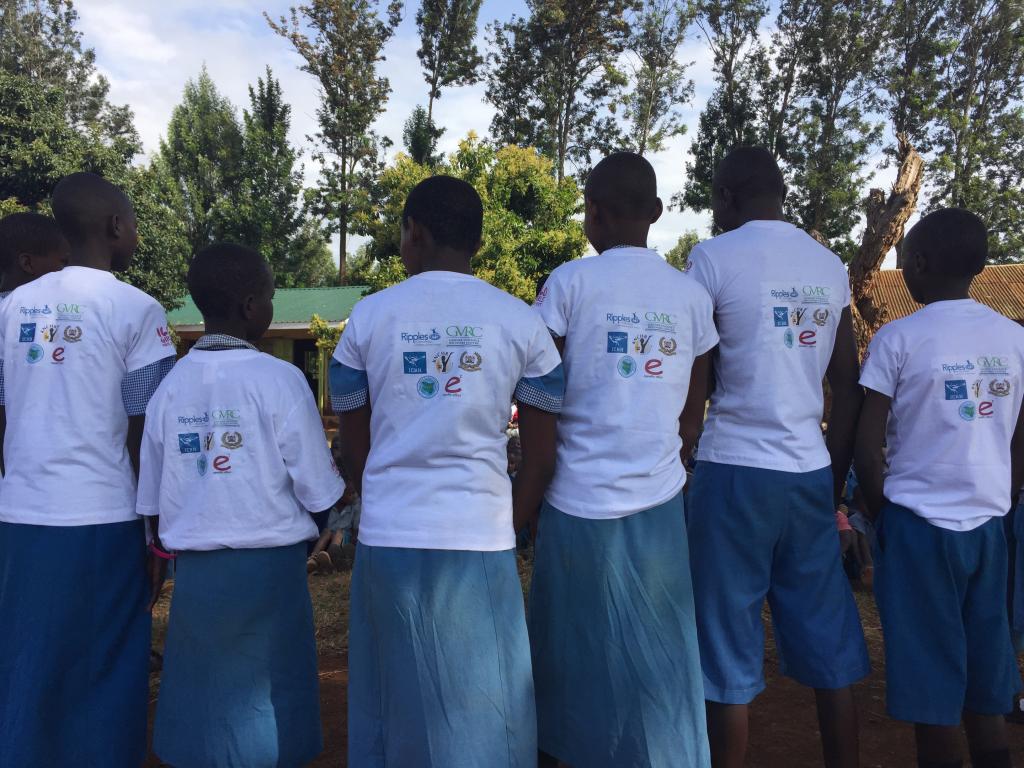
Justice clubs presentation at Tigania primary school. Credit: Nicole Thompson.
This summer, I spent each work day reading the case files of young girls who had experienced sexual abuse, and followed their cases through the Kenyan judicial system. Then on the weekend, I would paint their nails or help them to colour pictures of barnyard animals at the Tumaini (Hope) Children’s Shelter. I applied to the IHRP Fellowship program because I knew that I wanted to take my classroom experiences and translate them into meaningful contributions abroad. This is exactly the kind of experience I got while working for the Equality Effect in Meru, Kenya.
Despite the steps taken by the Kenyan legislature and judiciary, sexual violence against women and girls is endemic throughout the country. Approximately 1 girl is raped every 30 minutes. In 2013, the High Court of Kenya heard a constitutional petition from Equality Effect representing 160 girls in the Meru region, who were all survivors of defilement and abuse. In attempting to access justice, many of these girls encountered significant obstructions by the police. In response, the High Court ruled that all police officers had an obligation to conduct ethical, thorough, and prompt investigations in all defilement cases. To ensure that this decision was about more than just a pro forma acknowledgement of responsibility, the Equality Effect has implemented public legal education, court monitoring, and police training programs.
Prior to arriving, I had built up expectations about what this type of legal work would look like: I would spend my summer conducting legal research and visiting court. Perhaps I would be able to assist in training seminars that battled the stigma attached to survivors of sexual violence. While I did all of these things and more, my fondest memories, and the experiences that will most shape my future as a lawyer, took place at the shelter. Run by Equality Effect’s local partner Ripples International, the Tumaini shelter provides security, basic care, and a community of support to girls who are testifying in ongoing sexual violence cases, or escaping abusive situations.
Law students analyzing cases in law school, even ones with troubling facts, are often insulated from the emotional and psychological effects that systems of justice can have on the parties involved. These personal connections allowed me to see how these institutions, in both their successes and failures, affected survivors in a way that would not have been possible from the classroom. These weren’t always legal skills that I was developing, but in connecting with these girls and their culture, I became a better advocate.
A Summer of Migration: Living, Learning and Teaching
Rachel Bryce (2L JD/MGA)
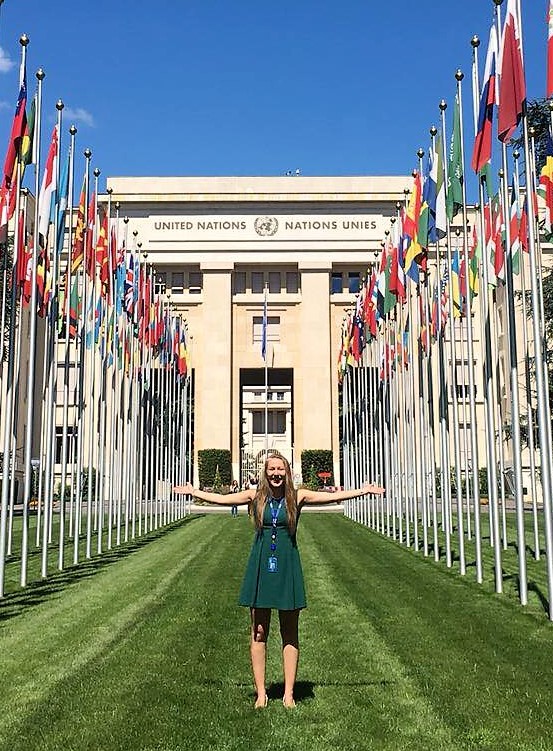
Basking in international diplomacy at the Palais des Nations. Credit: Brenda Chang.
On an early Monday afternoon last April, my flight descended over Lac Léman, surrounded by the majestic Swiss Alps. I arrived in Geneva for four of the most meaningful and memorable months of my life. Thanks to the IHRP, I had the opportunity to work with the International Migration Law unit at the International Organization for Migration (IOM), the United Nations Migration Agency.
I was a part of a five-woman team with two other exceptional interns who have become lifelong friends. In this tight-knit team, I researched LGBTI migrant rights and discretionary humanitarian protection. I authored and co-authored Information Notes on this research to update the IOM staff on the current state of international law. I attended and reported on the Global Compact for Refugees consultations and Human Rights Council (HRC) events. Both offered the chance to understand how international agreements are made, but the more personally significant interactions came from the HRC side events engaging members of the academic and non-profit worlds. Especially impactful was the HRC side event hosted by the Special Rapporteur on Internally Displaced Persons (IDP), which welcomed visiting IDPs to share their stories and experiences. A second event hosted by the Special Rapporteur on contemporary forms of racism was similarly impactful through its passionate discussion on the intersections of migration, racism and xenophobia. Taking these experiences back into the office motivated day-to-day briefs and background research for the monthly training missions to Member States, as well as the frequent editing of field office country reports.
Beyond the professional, this summer was socially and personally fulfilling. The intern network in Geneva filled all non-work hours with bright, motivated individuals who all shared my desire for adventure and travel. I formed friendships in these past four months that have forever changed my life. As expensive as life can be in Geneva, it is the heart of Europe and travel to neighbouring countries is comparably cheap. At the risk of sounding like the stereotypical millennial globetrotter, I escaped almost every weekend and saw cities throughout France, Italy, Spain, England, and Switzerland. The wealth of culture, art and history in Europe is astounding and often felt surreal compared to our relatively young country. I remember distinctly walking through the Jewish Quarter in Rome, passing yet another grand stone ruin and feeling as if I was on a film set, not actually passing by buildings that would have stood proudly in that very city millennia ago.
Without hesitation, to any future IHRP fellows, I recommend taking full advantage of both the professional and personal opportunities that come from the internship experience. Ask for work you are passionate about, surround yourself with like-minded, adventurous individuals, and travel as much and as cheaply as possible. These memories will stay with you forever and will define how you see the world and yourself for the rest of your life.
International Justice Never Rests: Our Summer in The Hague
Emily Tsui (2L JD/MGA) and Spence Colburn (2L)
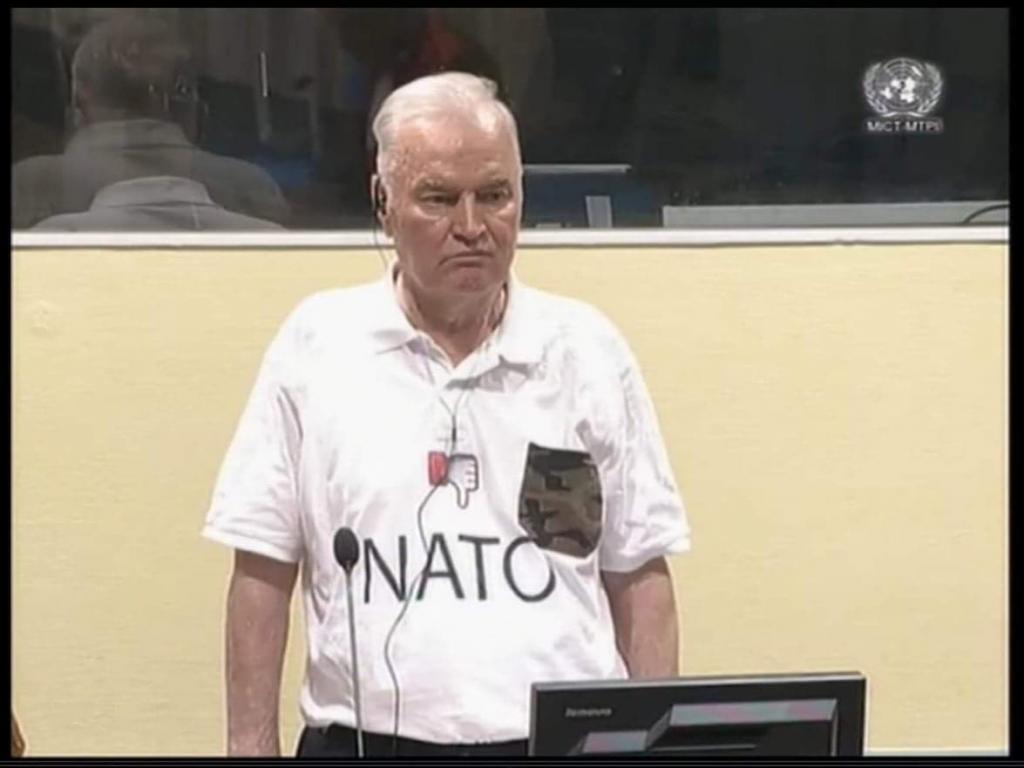
Mladic testifying at the Status Conference. Credit: Screenshot of public hearing.
For three months this summer, we interned at the International Residual Mechanism for Criminal Tribunals (IRMCT) in the Office of the Prosecutor’s Trial and Appeal Divisions. We had a fantastic summer learning about international criminal law in the beautiful Dutch city of The Hague - the international city of peace and justice.
IRMCT works on ongoing cases relating to the 1990s Yugoslav conflict and the 1994 Rwandan genocide. The individuals that appear before the Tribunal are the principal architects of war crimes, genocide, and crimes against humanity during these conflicts. Working at the Tribunal was a great way to learn about these important points of history, human rights, international criminal law and international humanitarian law. We were drawn to IRMCT because we wanted to learn more about these fields, liked the idea of working in ongoing litigation, and were excited to live in a place like the Netherlands for a summer. Our internship experience exceeded our expectations.
As it was our first time working in international criminal law, we faced some challenges in our work. In the Trial division, Spence worked on ongoing litigation pertaining to Prosecutor v Stanišić & Simatović. It was tough at times to manage the competing expectations of up to eight trial lawyers, and there was a large amount of administrative assignments relative to substantive work. In the Appeals division, Emily worked on the pre-appeal phase of Prosecutor v Ratko Mladić, principally on the acquitted charge of genocide in the municipalities of Bosnia and Herzegovina. Navigating the voluminous case law and understanding the legal context was difficult, especially in the absence of a single database to search through the jurisprudence.
However, these challenges were far outweighed by the highlights of our internship. We both learned a lot by conducting legal and factual research, interacting with our highly-accomplished supervising attorneys, and receiving tours of the evidence archive. In particular, Spence was able to appear in court and attend witness proofing, which is an extraordinary experience for a student that has just completed 1L. It was exciting for Emily to come up with arguments to rebut the defence and to conduct academic legal research. We both had the sobering opportunity to observe the accused in court, including watching former Bosnian Serb General Ratko Mladić spout political diatribe about the Tribunal’s unfair targeting of Serbs while wearing a “Down with NATO” t-shirt. Throughout these experiences, we had the fortune of being a part of the remarkable intern community in The Hague, which included interns from Hong Kong, Australia, Ireland, Aruba, and Kyrgyzstan.
We strongly encourage all students to consider completing an internship at IRMCT, and more broadly, in The Hague. The IHRP fellowship is a fantastic opportunity to travel and be funded for doing so. For most students, the 1L summer represents one of the last times they will have the freedom to go abroad before accepting a 2L position in Canada. We would advise students interested in internships in The Hague to apply early. Many of these positions begin accepting applications in October and are handed out on a rolling basis. Finally, if any student has questions about IRMCT, The Hague, or an IHRP fellowship generally, we are happy to share our experiences further over Facebook or coffee.







